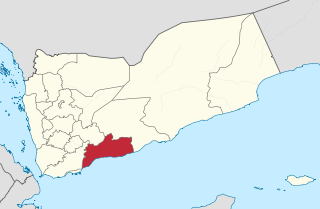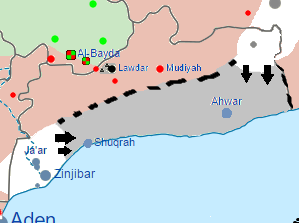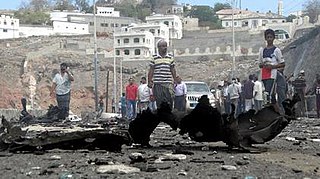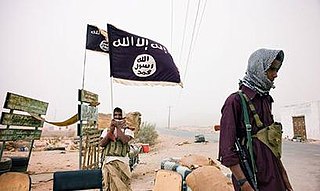In its war on terrorism in Yemen, the US government describes Yemen as "an important partner in the global war on terrorism". There have been attacks on civilian targets and tourists, and there was a cargo-plane bomb plot in 2010. Counter-terrorism operations have been conducted by the Yemeni police and the Yemeni and US military.

Qasim al-Raymi is the current emir of al-Qaeda in the Arabian Peninsula (AQAP). Al-Raymi is one of 23 men who escaped in the 3 February 2006 prison-break in Yemen, along with other notable al-Qaeda members. He next appears in connection to a July 2007 suicide bombing that killed eight Spanish tourists. In 2009, the Yemeni government accused him of being responsible for the running of an al-Qaeda training camp in Abyan province. After serving as AQAP's military commander, al-Raymi was promoted to leader after the death of Nasir al-Wuhayshi on 12 June 2015.

The South Yemen insurgency is a term used by the Yemeni government to describe the protests and attacks on government forces in southern Yemen, ongoing since 27 April 2009, on South Yemen's independence day. Although the violence has been blamed on elements within the southern secessionist movement, leaders of the group maintain that their aims of independence are to be achieved through peaceful means, and claim that attacks are from ordinary citizens in response to the government's provocative actions. The insurgency comes amid the Shia insurgency in the country's north as led by the Houthi communities. Southern leaders led a brief, unsuccessful secession in 1994 following unification. Many of them are involved in the present secession movement. Southern separatist insurgents are active mainly in the area of former South Yemen, but also in Ad Dali' Governorate, which was not a part of the independent southern state. They are supported by the United Arab Emirates, even though the UAE is a member of the Saudi Arabian-led coalition working to support the Yemeni government under President Abdrabbuh Mansur Hadi.

The Al-Qaeda insurgency in Yemen refers to the armed conflict between the Yemeni government with United States assistance, and al-Qaeda-affiliated cells. The strife is often categorized as a sub-conflict in the greater Global War on Terror.

The 2012 Abyan offensive was an offensive by the Yemeni military against Islamist militant forces, possibly including elements of Al-Qaeda in the Arabian Peninsula (AQAP), in the province of Abyan with the purpose of re-capturing the militant-held towns of Zinjibar and Jaʿār.
The following lists events that happened during 2014 in Yemen.
The following lists events that happened during 2012 in Yemen.
Timeline of the Yemeni Crisis (2011–present) refers to events of the Shia insurgency in Yemen, the 2011 Yemeni Revolution, the Al-Qaeda insurgency in Yemen and the South Yemen insurgency.

The Abyan campaign was a campaign for control of the Abyan Governorate of Yemen, between the Houthis and Yemen Army units loyal to Ali Abdullah Saleh on one side, and militiamen and Yemen Army units loyal to Abd Rabbuh Mansur Hadi on the other side, supported by jihadists of al-Qaeda in the Arabian Peninsula. The Pro-Hadi Forces recaptured the Abyan Governorate on 11 August, after launching an offensive on pro-Houthi forces in early August.

In early December 2015, two Yemeni towns, Zinjibar and Ja'ar, were captured by the jihadist group Al-Qaeda in the Arabian Peninsula (AQAP). Zinjibar was retaken by pro-government forces 14 August 2016. This was the second capture and occupation of Zinjibar during unrest in Yemen. The town was earlier taken by AQAP’s in May 2011 and held until the summer of 2012.

The Southern Abyan Offensive refers to a 2016 offensive that AQAP launched in late February, which ended with a victory for AQAP as Yemeni tribal fighters loyal to president Abdrabbuh Mansur Hadi were driven out of the Abyan Governorate.

The Aden unrest refers to initialy ongoing conflict between Islamist factions, such as al-Qaeda in the Arabian Peninsula, and Islamic State of Iraq and the Levant's Yemen Branch, against the loyalists of president Abd Rabbuh Mansur Hadi and later to conflict between UAE-backed and Saudi-backed factions within the coalition. In 2017, fighting also broke out between factions aligned with different members of the Saudi-led coalition namely Saudi Arabia-backed Abdrabbuh Mansur Hadi and Al-Islah and UAE-backed separatist Southern Transitional Council and Southern Movement.

Shabwah Governorate offensive (2014–present) refers to an ongoing campaign by AQAP to take control of Shabwah Governorate, during their insurgency, and until today, at Yemeni civil war.
The Second Battle of Mukalla refers to an armed conflict between al-Qaeda in the Arabian Peninsula (AQAP) and the Saudi-led Coalition. The aim of the coalition offensive was to disable the newly resurgent al-Qaeda Emirate in Yemen by recapturing its capital, Mukalla. The battle led to a coalition victory, in which the coalition forces gained control of Mukalla and the surrounding coastal areas.
The following is a timeline of the Yemeni Civil War (2015–present), which began in March 2015 and is ongoing.
Usayd al-Adani was a senior leader of Al-Qaeda in the Arabian Peninsula. He was killed by a missile launched from a surveillance drone, on March 2, 2017. His killing attracted additional scrutiny as one of the seven other individuals killed by the missile was Yasir al-Silmi, said to be another name for an individual formerly held in extrajudicial detention in Guantanamo, Mohamed Tahar.

The Abyan conflict (2016–present) is a series of clashes between forces of AQAP loyal to Yemeni president Abdrabbuh Mansur Hadi, and forces loyal to Southern Movement for the control of Abyan.












